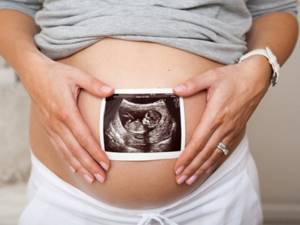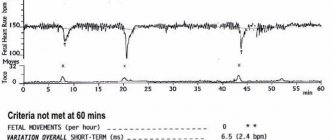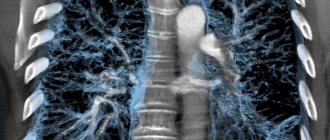To assess the course of pregnancy and embryogenesis, there are many important criteria, one of them is the weight of the fetus.
The child’s weight is determined using an ultrasound examination; certain values are used for this:
- head circumference (HC) and abdominal circumference (AC);
- biparental size (BPD);
- fronto-occipital dimension (OFD);
- coccygeal-parietal size (CRL);
- thigh length (FL);
- diameter of the fertilized egg (internal, GS).
Let's consider what the normal weight of the fetus should be and how it is determined.
Child development
At the 21st week, the child’s height is about 25 cm, and the weight of the fetus is 300-400 g. The fetus is very similar to a newborn baby, however, due to the lack of subcutaneous fat, the body is still very thin, and the head seems unnaturally large. During this period, the formation of eyelashes and eyebrows occurs, the baby learns to blink, and his skin gradually acquires a flesh color, thickens, and constrictions appear on it.
At week 21, the muscles and skeleton of the fetus are actively developing. The child constantly moves, carefully bends and straightens his limbs, thanks to his small size he can do somersaults, turns, change the position of his body several times a day, position himself transversely in the uterus, turn up or down with his head.
At this stage, the baby hears well, not only distinguishes sharp sounds, but reacts to music, so the expectant mother can listen to classics or favorite songs and contribute to the development of the child. The development of the digestive system continues, and taste buds are formed. The fetus can taste the amniotic fluid.
Pregnant woman
A pregnant woman at 21 weeks feels fine. The expectant mother clearly feels the movements of the fetus; very often the periods of sleep and activity of the child and the woman do not coincide, so pregnant women at this stage do not get enough sleep and wake up at night due to the intense movements of the baby. Painful sensations at this stage are quite rare, since the child does not have sufficient physical strength, and his movements are not intense.
A pregnant woman may gain weight as the baby grows and its muscle and fat mass increases. Expectant mothers eat with pleasure. Their appetite increases significantly, morning sickness and general malaise disappear.
During this period, the baby’s skeleton is formed, the development of which requires calcium. Pregnant women should monitor their health and take calcium supplements as prescribed by the doctor, since a lack of calcium may cause dental problems. Calcium is washed out of the tissues, teeth begin to hurt and crumble. It is important not only to consume vitamins, but also to carefully balance the diet, add calcium-rich cottage cheese, sour cream and other dairy products to the daily menu. Eating fish, grains, legumes, and vegetables will help replenish calcium deficiency.
Child development
The body length of the fetus reaches 28-30 centimeters, and its weight is approximately 500 g. The baby grows, the proportions of his body, the ratio of the sizes of the head and torso change. The child looks more and more like a newborn, his head no longer looks so big, and the length of his limbs increases. The baby no longer keeps his legs constantly bent, he periodically straightens them. The volume and weight of the child’s brain rapidly increases.
The baby is in constant motion, he can move his fingers and toes, and moves his head to the right and left. The child knows how to suck his thumb, he tilts his head forward and accurately puts his finger in his mouth. Such actions indicate increased sensitivity and development of the vestibular apparatus, improved coordination; the child already feels the position of his own body in space.
At this stage, the baby’s brain contains a full set of neurons, the number of which does not change throughout a person’s life. With age, connections between cells are reformed and the functioning of the human brain improves.
Check weighing
Control weighing is carried out when you need to find out whether the baby has enough breast milk. In the case of artificial feeding, there are no problems with controlling the amount of food taken.
The weighing rules are:
- We take measurements before and after one feeding;
- we try to use the same scales;
- We make sure that the baby wears the same clothes;
- If the baby gets his diaper dirty during feeding, there is no need to change or remove it;
- We take measurements several times in a row during the day or on different days to get a reliable result.
If the results show that there is not enough milk, then the mother needs to think about increasing lactation. Ask the pediatrician who is caring for your newborn to select a drug.
Up to 10 days, the calculation is carried out according to the formula: milk volume = 2% of body weight multiplied by the number of days of life. For example, our fictional baby weighing 3,200 on the fifth day of life should eat 320 ml of milk per day. We divide this figure by the number of feedings.
For older children, a different method is used. From 2 to 4 weeks, the required milk volume is 1/5 of body weight per day, from 6 weeks to 4 months - 1/6.
Pregnant woman
At 22 weeks, the uterus of a pregnant woman is located 2 cm above the navel. The abdomen is not yet very large, but the internal organs are already beginning to shrink due to the accelerated growth of the uterus. A woman may experience some discomfort and pain between the lower ribs. In order not to suffer from pain, you need to constantly monitor your posture and choose a comfortable chair with a strong back for work. Special exercises, periodic changes in body position, turns and bends will help solve the problem. It is necessary to avoid sedentary work, take short breaks and get proper rest.
The fundus of the uterus can put pressure on the stomach, so a common problem at this stage is a feeling of heaviness after eating and heartburn. The position of the stomach in pregnant women changes to a more horizontal one, the muscle that closes the passage from the esophagus to the stomach relaxes, as a result of which the contents of the stomach flow back into the esophagus, irritating it, the woman feels a burning sensation and an unpleasant taste. The reason for such changes is not only the pressure of the uterus on the stomach, but also a change in the hormonal background of a woman, an increase in the content of progesterone in the body. To get rid of heartburn, you need to chew food thoroughly and eat often, but in small portions. You should not eat before bed, as the food will not have time to digest. If symptoms intensify, you should consult a doctor who will prescribe the necessary medications and help the expectant mother balance her diet.
Child development
The 23rd week is an intensive formation of the respiratory system. The fetus begins to gradually make breathing movements. If earlier the respiratory movements were periodic, now their duration can reach up to 40 minutes. In a minute, the child takes up to 50-60 breaths. The development of the respiratory system does not stop at this stage, a kind of breathing exercises continue until birth, the baby improves his skills and prepares to breathe air.
When breathing in the womb, the baby swallows a small amount of amniotic fluid and then pushes it out. In this case, the epithelium is washed. When amniotic fluid is swallowed, part of it is absorbed by the blood vessels, and the original feces, that is, meconium, are formed from the remains.
If the baby is overactive and swallows water very intensively, irritation of the diaphragm and its contractions, which are also called “fetal hiccups,” may occur. These rhythmic movements are not an aberration; such hiccups go away in a few minutes and do not pose a threat to the expectant mother and child. If contractions do not stop within a few hours, you should go to the hospital, as the hiccups may be caused by a more serious problem, including hypoxia.
The 23rd week is an important stage in human intrauterine development. It is during this period that the formation and improvement of the main components of the circulatory and immune systems continues, including the liver, lymph nodes, spleen and bone marrow. During this period, the thymus gland (or thymus) develops, which plays an important role in the functioning of the human endocrine system. It is in the thymus gland that lymphocytes mature. After a kind of “training” in the thymus, the cells enter the bloodstream and can resist infection and neutralize foreign cells in the body.
During pregnancy, the fetal immune system goes through several stages of formation and cannot provide complete protection against diseases. The child is protected by maternal antibodies, and his own immune system learns to recognize a potential threat, remember bacteria and viruses and protect itself from their harmful effects.
Pregnant woman
At 23 weeks of pregnancy, the uterus rises even higher and is located at a height of 4 cm from the woman’s navel. The volume of the uterus increases significantly not only due to the growth of the child, but also due to an increase in the mass and volume of amniotic fluid and the placenta. At this stage, the optimal weight gain for a pregnant woman is 5-7 kg. The expectant mother should carefully monitor her daily nutrition and not overeat, since excessive weight gain can pose a threat not only to her health, but also to the baby.
Intensive growth of the uterus causes a shift in the center of gravity. The woman becomes awkward and may feel discomfort in the joints and pain in the spine while walking or sitting for a long time. At this stage, the doctor may recommend that the pregnant woman wear special supportive underwear made from natural materials or a bandage.
Is it possible to increase fetal weight during pregnancy?
If the fetal weight is less than normal, then the first thing the doctor will advise is nutritional correction. A pregnant woman should reconsider her diet; there must be a normal balance of vitamins, trace elements, and minerals. You need to stick to the diet if it is prescribed by your doctor. Many women suffer from swelling and high blood pressure when carrying a child. In this case, it is recommended to reduce the consumption of salt, marinades, sauces, smoked foods, and fatty foods.
The correspondence of a woman’s weight to her gestational age can be calculated using a pregnant woman’s weight norm calculator.
The expectant mother should not drink alcoholic beverages that negatively affect embryogenesis. It is necessary to completely eliminate smoking, which can lead to oxygen starvation of the fetus, which leads to a decrease in its weight. There are nutritional mixtures that are recommended for women during the gestational period. This will help maintain the child’s weight at the proper level in accordance with the deadlines. The main thing that the doctor must find out is the reason for the insufficient increase, to stimulate which the pregnant woman can be hospitalized in a hospital to carry out compensatory therapy.
Child development
At 24 weeks of pregnancy, the baby continues to grow rapidly, he already weighs 600 g, and his height is approximately 33 cm. The fetus occupies the entire uterine cavity, so its movements are no longer so impulsive, but more distinct; sharp movements are replaced by smaller ones. The baby can still radically change the position of his body, but prefers to finger the umbilical cord, play with it, bend and straighten his arms and legs. The amount of muscle mass, namely the child’s muscle fibers, increases sharply. At this time, this indicator reaches its maximum. In later stages of pregnancy, fetal muscle mass increases due to an increase in the volume of each muscle fiber.
This week the child’s senses are improving. He can distinguish tastes, hears well and orients himself in space, the baby’s skin is highly sensitive. The fetal brain continues to develop, connections with the senses are formed, so the child’s behavior is highly complex. Studies have proven that the child reacts to external stimuli: if a bright light hits the mother’s stomach, he turns his head away, closes his eyes or covers his face with his hands. A woman should be calm and peaceful, because her fear and excitement are transferred to the child, he begins to move intensely or suddenly freezes. The baby may react to sudden sounds, noise or other irritants.
The weight of the newborn and the physique of the parents
Constitutional characteristics are inherited, as are hair color, eye color or character. But this does not mean that the baby will be a copy of mom or dad: perhaps he will inherit the features of a distant relative.

Of course, calculating the normal weight of a newborn baby is important. It further affects his health, especially if the cause of the deviation is any serious illness. But if these are simply constitutional features, the baby will quickly gain weight in the future or normalize it if there was paratrophy. The main thing for him now is the care and attention of his mother and father, adherence to a daily routine, adequate nutrition and walks.
Pregnant woman
The weight of a pregnant woman continues to increase, the increase this week is about 500 g. The belly is growing, the uterus not only increases in size, but also stretches. A woman may notice painful sensations in the abdominal area, but they are not intense and do not last long.
Rapid weight gain can cause edema. The growing uterus compresses large veins, which, in turn, significantly complicates the outflow of lymph; The woman’s ankles, feet, and hands swell, and the problem gets worse in the evening. A pregnant woman should get proper rest, lie down more, and elevate her legs with a bolster or place an additional pillow to improve the outflow of venous blood and eliminate the risk of varicose veins. It is important to purchase comfortable shoes, avoid stiletto heels and provide your feet with the necessary comfort. Wearing compression tights and stockings will help significantly reduce the risk of developing varicose veins and the appearance of edema. When choosing the degree of compression and models, it is necessary to take into account the opinion of a phlebologist or gynecologist.
Calculation based on other indicators
To determine the weight of the fetus by week of pregnancy, the most accurate diagnostic method for this case is used - ultrasound sonography. A scheduled examination is carried out three times in each trimester and unscheduled when necessary. Ultrasound allows you to perform fetometry, monitor the progress of gestation, identify the risks of possible complications, and make many other measurements,

determine vital criteria, assess the health of the mother.
There are other methods for calculating fetal weight that are less reliable than ultrasound, but they are still used. So, the height of the fundus of the uterus and the circumference of the abdomen are measured in centimeters, these values are multiplied, and the weight of the child is obtained. The error of the method is up to 200 grams since it is impossible to take into account the amount of amniotic fluid, the constitution of the mother, presentation, and genetic characteristics. This technique can only be used after 32 weeks of gestation.
The website has a convenient service for calculating the baby's weight by week of pregnancy. Several values are entered into special columns and automatic calculation shows the required parameter. The entire operation takes a minimum of time. But using this online form you can only control the required values; the main calculations are made by the doctor during examination and ultrasound examination.
If a woman does not have any special health problems during pregnancy and there are no complications, then the baby’s weight will be normal both during intrauterine development and at birth. If some values do not coincide with the data in the table, then you do not need to draw conclusions yourself; remember that everything is individual and only a specialist can make the final verdict.










